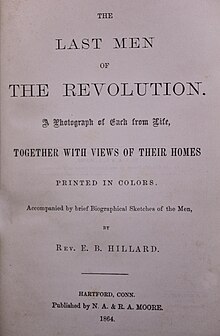The Last Men of the Revolution
 Title page of first edition | |
| Author | Rev. E. B. Hillard |
|---|---|
| Language | English |
| Genre | Biography |
| Published | 1864 |
| Publisher | N. A. & R. A. Moore |
| Publication place | United States |
The Last Men of the Revolution is a compilation of biographies written by Rev. E. B. Hillard (Elias Brewster) documenting six of some of the last living veterans of the American Revolution who were alive in 1864.[1][2] The book contains six albumen prints, one for each veteran documented excluding James Barham.[3]
List of interviewees
[edit]- James Barham (1764–1865) served in the Virginia Militia. He was a resident of Greene County, Missouri.
-
Samuel Downing (1764–1867) of Mass.; resident of NY State
-
Daniel Waldo (1762–1864) of Ct.
-
Lemuel Cook (1759–1866) of Ct.; resident of NY State
-
Alexander Milliner, aka Alexander Maroney (1760/1770–1865) of NY State
-
William Hutchings (1764–1866) of Mass.; resident of Maine
-
Adam Link (1762–1864) of Pa.; resident of Ohio
-
John Gray (1764–1868) not listed in Last Men; Served 6 months Va. Militia; resident of Ohio
-
Daniel F. Bakeman (1759–1869) not listed in Last Men; service NY Militia (disputed); of NY State. Last pensioner of the Revolution.
Edward Everett's letter
[edit]
On January 15, 1865, Edward Everett, former Governor of Massachusetts, wrote a letter to the publishers N. A. & R. A. Moore expressing his appreciation for their book. The letter was written the day he died and is his last known letter. Soon after the letter was written it was in possession of Mr. James Parker, of Springfield Ma., an antiquary and collector of autographs.[4] He had the letter lithographed and made copies of the book with the letter's facsimile in the front, copies were given to his friends.
Edwards Everett's letter:
Boston, 15 Jan. 1865.
GENTLEMEN,- Since I received your favor of the 7th and the little volume accompanying it, I have been very ill, and now am able to answer but very briefly. I have looked through the Biographies with interest, and they appear to me to contain all that can be expected. The anecdote of General Washington's stopping to "jerk stones" with the men is excellent, and is in accordance with the traditions of his youth which describe him as being able to throw a stone over the Rappahannock below Fredericksburg. In the year 1836, being governor of Massachusetts, I signed a Pension Warrant for a person who lost an arm at Fort William Henry in 1757.
I remain, Gentlemen, respectfully yours,
Edward Everett.
References
[edit]- ^ Finefield, Kristi (7 November 2013). "The Last Men of the Revolution". Library of Congress. Retrieved 2 February 2017.
- ^ "American Revolution.org; The Last Men of the Revolution".
- ^ "The last men of the Revolution". Internet Archive. 16 November 2018.
- ^ "Proceedings of the Massachusetts Historical Society". Books.Google. 1912.








